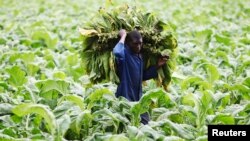Zimbabwe is hoping to one day regain its former title as the breadbasket of southern Africa.
Millions of farmers are being trained in a United Nations-backed program called “Pfumvudza,” which means “early shoots” in Shona. Pfumvudza is a method of conservation agriculture that focuses on small plots that retain water easily, and it is more efficient than large-scale ploughing.
“It is easy to maintain,” said George Nyamakawa, 52, who lives in Murehwa district about 100 kilometers east of Harare. “At the same time, it gives more food to the nation.”
The U.N. Food and Agriculture Organization (FAO) has trained government officials on the method to help combat food shortages that have plagued Zimbabwe for over a decade.
Zimbabwe’s government has touted the program as a possible food security solution, but the U.N. World Food Program (WFP) is still providing food aid to about 8 million Zimbabweans – more than half the population.
“I think it will take a bit of more time to work towards zero hunger and eradicate the problem all together,” said Niels Balzer, WFP Zimbabwe deputy director.
“We have a La Nina season ahead, that means normal to above normal rainfall, which the scientists predict, and we are very happy about that,” he added. “So combined with the Pfumvudza approach or method, I think it will make a difference and we can increase the output.”
“Early shoots” farming has its limitations, according to Mandivamba Rukuni, a former economics professor at the University of Zimbabwe who now directs a charity focused on farming innovation in Africa.
He thinks Pfumvudza has advantages, especially in that it uses easily available labor technology – “anyone can dig a small hole and plant” – and that it conserves water. As for disadvantages, he said, “The main one is it’s very labor intensive.”
In Zimbabwe, like in many other countries, labor is becoming scarce, especially in rural areas as people move to urban areas.
Farmers like Nyamakawa say they are willing to do the extra work if the yields are higher and if they can count on authorities for support.




